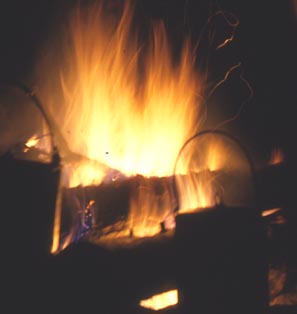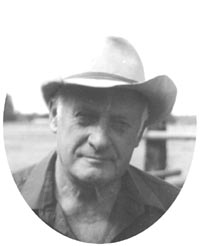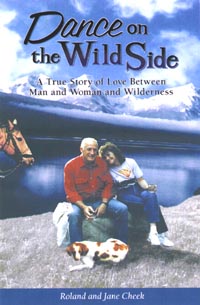The book Learning To Talk Bear is the best book I have ever read and prepared me for my first grizzly sighting / email from Susan Bearer
You can read the weblog Jennifer refers to by hitting the yellow archives button on the left, then scrolling down to February 6, 2007 - Poker or Camping: He'd Do To Draw To
Chocolate Legs is a superb book capturing the essence of a single wild animal. It will reside on my bookshelf alongside the best of Will James or Farley Mowat / Duncan LaSade letter
a weblog sharing info on outdoor skills and campfire musing by a guy who spends a bunch of time in pursuit of both
CULTURE
WHERE -
TALES ARE TOLD OF
Welcome to Roland Cheek's Weblog
Roland is a gifted writer with a knack for clarifying reality. Looking forward to more of his wisdom
- Carl Hanner e-mail
It is said General U.S. Grant once expressed contempt for a certain officer. Another officer protested that the man in question had been through 10 campaigns.
"General," said Grant, "so has that mule yonder, but he's still a jackass."
Having lived my three-score ten, I fear Grant is right -- experience is not a trustworthy measure of intelligence. On the other hand, having spent a little time in the company of mules, I'd reckon them as some smarter than most generals.
To acess Roland's weblog and column archives
Tip o' the Day
Ever out in the big lonesome and discovered your watch quit God knows how many hours ago and you need to know how much time left until sundown? Line one hand between sun and horizon (arm outstretched, fingers together at right angle to the arm); each finger is approximately 15 minutes.
How about direction when you're without a compass and it's a dank, overcast day? Forget that old wives' tale about moss growing heavier on the north side of trees. Moss grows slowly in the high country at our latitude and you don't have time to wait for it to grow. Try this instead:
Spread a white cloth (handkerchief, T-shirt, longhandle underwear (if it's still white) flat upon the ground. Hold a slender stick vertically, moving it around the perimeter of the cloth. A suggestion of a shadow can be determined when the stick is between sun and cloth, even when the sun cannot be otherwise located. Now point the hour-hand of your watch at the sun. Halway betweeen the hour hand and 12 0'clock is due south. (Note: use standard time. Note: those with digital watches will have to fake it.)
What happens when you've discovered south and how much time until sundown, but still don't know which direction to camp, nor how long it'll take to get there?
Survival books say to "Stop early enough to gather firewood for the night," and it's good advice. Most of 'em don't tell you how much wood to gather, however, so I'll tell you to lay in more than you'll need . . . then double the supply. Having slept out many nights using chaps for pajamas, backed against a rock wall or boulder to reflect heat, drowsily fighting sparks from my new wool coat, I qualify as an expert. And I say night is always darkest just before dawn. It's also coldest. Ironically, dawn is also when you'll run out of fire--if you've shorted your wood supply the night before.
Of course if a man straddles a good horse there's no logical reason to gather a big supply of firewood and spend the night in the fearsome lonesome unless he wishes to do so. Give a veteran horse his head and you'll eat supper in camp. Confuse him and you might wind up as hungry as an Ethopian famine survivor.
I once followed my pony down a perilous trail in an inky night. I did so by tying the halter rope to his bridle reins, then walking behind with one hand loose-holding the rope and the other holding his tail. I figured to let both go if he disappeared into the chasm below. He never even stumbled.
In fact, if anything, he seemed put out that I never crawled into the saddle and let him hurry home.
I am sitting here with tears pouring down my cheeks in great appreciation for what you have written about my father in law. I am the mother of "his" triplet grandchildren . . . It is hard for me to explain what a BIG loss it has been because it is hard to explain to people what a great person he truly was / email from Jennifer West
* * *
MONTANA'S CULTURAL APPRECIATION GAME PLAN
I've always admired culture. Got a nice ring to it. Goes beyond obvious phonic similarities, like vultue, rupture, suture, and troglodyte. Makes a body want to buddy up to it; think uplifting thoughts: "Jane, did you sew a new button on the back flap of my union suit?"
Cultural sites, I'm told, are supposed to be tourism's new wave. Distinct possibilities arise for history's previously undersold centers of Treasure State enlightenment, such as Havre's underground town, a functional place to locate during the bootlegging era; Butte's Mercury Street, also a place of high repute during prohibition; and Helena's Capitol Dome, of diametric low repute, then, now, and hopefully ever after.
We Montanans have distinct cultural advantages over folks elsewhere--unfortunates who have to make more ado about much less. Take transport for instance: While Californians can only trace reliable conveyance to post-World War II and the advent of BMWs and Toyota Land Cruisers, Montana's mobile record can proudly be tracked to the American Indian's embrace of Coronado's horses; and before that to their "dog culture" days.
Montana waterways spawned canoes, pirogues, and steamboats while Kentucky was settled via ox-carts lumbering through mountain "Gaps."
Tennessee travelers wearied of slogging the mud of their Natchez "Trace" while up in Montana nail-driving men laid steel across a continent so that fjiord-loving Norsemen could search for dryland wheat farms in comfort.
It is said early Santa Fe traders went mad for want of vistas and water while crossing New Mexico's Llano Estacado--the Staked Plains. But up north, Canadian-bound whiskey haulers plying Montana's wild and wooly "Whoop-up Trail" enjoyed scenery galore and used water sparingly to add to the rotgut pilfered from barrels amid their freight.
Montana's first inhabitants were much less mean-spirited and conniving than those of eastern persuasion, engaging in hilarious, fun-filled competition with newcomers in places like the Little Bighorn, Big Hole, and the Bear's Paw mountains. Eastern natives, on the other hand, bilked the pale-skinned newcomers of 24 dollars worth of valuable trinkets in trade for Manhattan Island--at least twice what the place was worth then and now, even after 350 years of inflation and development.
We have a leg up on art, too, as any quick comparison between Charlie Russell and anybody else will show.
Ours is not called the Treasure State for nothing--even though a few other places like Mesabi iron, Comstock silver, or Homestake gold make idle and fraudulent claims on our namesake motto. Clearly we "ayes" have it by simply pointing with pride to the "richest hill on earth" (now the deepest lake in town).
In Montana, citizens hung their sheriff, and not the other way around. Meanwhile, corporations distributed suitcases filled with largesse to their favorite legislators, then bought office for their very own United States Senators . . . until the Company-In-Chief went belly-up in their own cascading hog swill.
We've got grizzly bears snoozing in suburbs, mountain lions adjacent to schoolyards, and wild wolves innoculated against canine diseases by government-paid biologists--a policy that is bewildering to the unenlightened 99.9 percent of Treasure State citizens.
We have horse sales where dumb rich folks bid real money on poinies who buck. We snag prehistoric fish that sport built-in paddles, still shoot buffalo, and hunt sandhill cranes.
You want culture? Culture we got to burn, culture to sell, and maybe even a little to use.
We're enlightened, emboldened, intriguing, and content. What more does one want?
Roland Cheek wrote a syndicated outdoors column (Wild Trails and Tall Tales) for 21 years. The column was carried in 17 daily and weekly newspapers in two states. In addition, he scripted and broadcast a daily radio show (Trails to Outdoor Adventure) that aired on 75 stations from the Atlantic seaboard to the Pacific Ocean. He's also written upwards of 200 magazine articles and 12 fiction and nonfiction books. For more on Roland, visit:
www.rolandcheek.com
Recent Weblogs
Tuesday, March 18, 2008
for more info about these and other Roland Cheek books
There's also tales of the antics of Robert West and his brothers in Roland's book on elk, The Phantom Ghost of Harriet Lou. You'll find more specific info about Roland's books, columns, and archives by clicking the buttons highlighted right and left. One can read a synopsis of each book, read reviews, and even access the first chapter of each of his titles.
for detailed info about each of Roland's books
Read Reviews
Read their first chapters
For interested educators, this weblog is especially applicable for use in environmental / nature classes, as well as for journalism students.
Roland, of course, visits schools. For more information on his program alternatives, go to:
I have just finished reading The Phantom Ghost of Harriet Lou and it touched my soul. You've illustrated everything that I embrace about hunting and elk hunting to be more specific / Mitch Ratigan email
I just finished your book Dance On the Wild Side. I didn't want it to end. You said you didn't finish high school. Where in the world did you learn to write like that? / Barb Richards email
My Best Work is Done at the Office is pure Roland Cheek, that is, a blend of wit, wisdom, and adventure in the Northern Rocky Mountains / testimonial on way to five star (*****) amazon.com rating
Next Week:
MOON LORE YOU CAN USE
www.campfireculture.com
to send this weblog to a friend
to tell Roland what you think of his Campfire Culture weblog
source links for additional info
to visit Roland's newspaper columns and weblog archives







